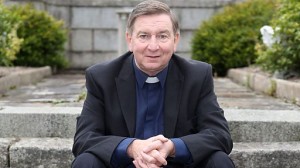
By Sarah Mac Donald - 24 October, 2013
 Well known media priest, Fr Brian D’Arcy, has warned that “anguish, rejection and the pain of abandonment will destroy your soul.”
Well known media priest, Fr Brian D’Arcy, has warned that “anguish, rejection and the pain of abandonment will destroy your soul.”
In his new book, the Passionist priest reveals that he survived his censure by the Vatican – what he terms his “dark night” and “the most devastating faith-crisis of my life” – by the “skin of my teeth.”
His book, ‘Food for the Soul’, which is published by Columba Press, is “an attempt to express my quest for a practical spirituality which would take me through the crisis I was plunged into.”
He explains to readers that along the painful journey he made a decision not to waste the rest of my life in anger and resentment. “I now know I can manage this journey of faith in a positive way,” he writes in the Introduction.
Fr D’Arcy also reveals that it was the thousands of letters he received from the public pleading with him not to give up the priesthood that helped him decide to stay rather become “a former priest”.
In his new book, the Passionist priest writes that his censure “destroyed” him “as a human being and as a priest.”
He says the book is not controversial but helped him chart a spiritual path through all that was going on between him and the Vatican.
In 2010, he was formally censured by the Congregation for the Defence of the Faith (CDF). The then head of that CDF wrote to the Superior General of the Passionists, the religious order to which he belongs, accusing him of being “a source of great scandal to the faithful” on account of his writings and broadcasts.
As a result, he received a formal canonical warning that he must cease being critical of the Vatican and stop questioning the Magisterium or the disciplines of the Church.
“At this point let me emphasise that I’ve always been at pains not to contradict the formal teachings of the Catholic Church, when I wrote and broadcast in the secular media,” the 68-year-old states.
The CDF never communicated with him directly, never indicated who was “scandalised” by what he wrote and he was warned that he could be excommunicated if he didn’t abide by the CDF’s rules.
“For three years now this censure has eaten me up inside and destroyed me as a human being and as a priest. The foundations of my faith were shattered.”
“An institution which treats people in such a threatening way does not, it seems to me, act in accordance with Gospel principles,” the Co Fermanagh-based priest claims.
Referring to his criticisms of the Church leadership’s handling of the child sex abuse scandals he states, “I was absolutely correct to do so.”
“I am a survivor of clerical sex abuse myself. I have been through enough personal devastation to recognise that secrecy is lethal when dealing with abusers,” he writes on the 50th anniversary of his profession as a Passionist.
He also admits he was critical of the Vatican’s approach to Church governance on the grounds that it lacked compassion and was not as Christ intended it.
He warns the Church leadership that “The people of God want pastors, not clergy acting like bureaucrats or government officials.”
Explaining briefly his journey he writes that in order to survive, “I had to find a sustaining faith, a spiritual life, which was meaningful, real and based on the theology of the Passion – a way of living and being, which had truth and integrity at its centre. Faith, I learned, is not something we lose; rather there comes a time when we just stop shaping our lives by it.”
With professional help, he concluded that he is called to write, broadcast and preach without such interference which the CDF has set out.
“Meaningful communication is founded on the ability to speak the truth. As an essential part of being true to Gospel values, I searched for a spirituality which was based on genuine human freedom; I am still searching,” he explains.
Slowly, he states, he has “begun to live and act confidently again. I recognise that nobody can give me back my freedom; I have to choose freedom for myself. Slow, painful, baby steps along the dark, twisted road to enlightenment, becomes nourishing food for my soul.”
“That’s where this book comes from. It’s not a controversial book. And it’s not about how the Vatican dealt with me (and is still dealing with me.) Rather it’s an attempt to share an accessible spirituality with anyone struggling to overcome disillusionment.”
“I believe there are many disillusioned people in the Catholic Church who long for encouragement, not condemnation and I hope they’ll find a kindred soul in these pages. We need a God we can trust; we need spirituality which heals.”
The one silver lining he sees in all of this came about when he was at his “lowest ebb physically and spiritually”. In February 2013 something “quite literally unbelievable happened” with Benedict XVI’s decision to resign from the papacy.
Now it is Pope Francis who is highlighting the short-comings of church structures and it is the Pope who is proposing changes remarkably similar to those for which Fr D’Arcy and others have been censured for, the ‘Turbulent Priest’ writes.
The book will be available in bookshops from early November according to Shane McCoy, Marketing Manager of Columba Press.